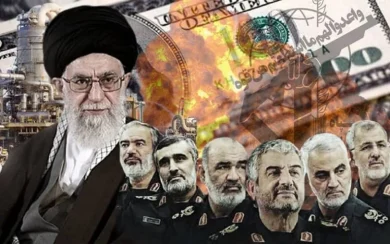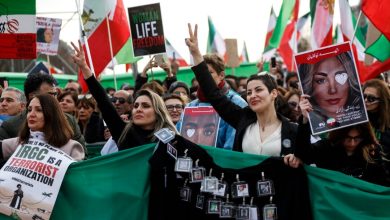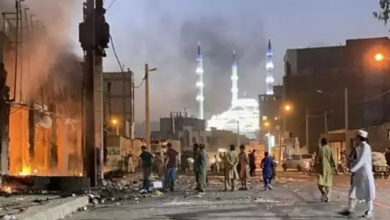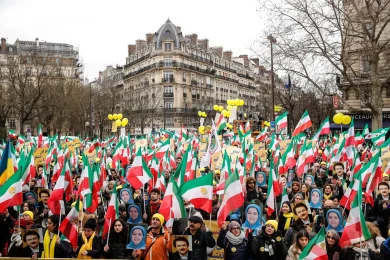The Islamic Revolutionary Guard Corps (IRGC) is a central force in maintaining the Iranian regime’s grip on power, often through methods that directly violate fundamental human rights. Tasked with safeguarding the Islamic Republic’s revolutionary principles, the IRGC has expanded its role into policing dissent, controlling information, and systematically silencing opposition within Iran. This analysis examines how the IRGC’s actions—ranging from suppressing protests to censoring media and imprisoning dissidents—have created an environment of fear and repression, stifling the voices of those who challenge the regime.
The IRGC’s Role in Suppressing Protests
Protests in Iran, whether sparked by economic grievances, political corruption, or social injustices, are often met with brutal crackdowns orchestrated by the IRGC. Alongside the Basij, a paramilitary organization under its control, the IRGC employs excessive force to quell demonstrations, often resulting in significant casualties and mass arrests.
1. Deadly Crackdowns
During the 2019 protests over fuel price hikes, the IRGC played a pivotal role in suppressing dissent. Reports indicate that security forces killed hundreds of protesters, with many shot at close range or targeted indiscriminately. Similar tactics have been used in response to protests over water shortages, women’s rights, and government corruption.
2. Use of Surveillance and Technology
The IRGC utilizes advanced surveillance technology to monitor and track protesters. By intercepting communications, monitoring social media, and employing facial recognition, the IRGC identifies and detains individuals deemed threats to the regime. This technological crackdown creates an atmosphere of constant surveillance, discouraging public dissent.
Censorship and Media Control
Controlling the flow of information is a critical aspect of the IRGC’s strategy to suppress opposition. Through censorship, internet shutdowns, and propaganda, the IRGC ensures that narratives favorable to the regime dominate while dissenting voices are silenced.
1. Internet Blackouts
The IRGC frequently implements nationwide internet shutdowns during periods of unrest. For instance, during the 2019 protests, the IRGC orchestrated a complete internet blackout to prevent protesters from organizing and to obscure the regime’s violent crackdown from international scrutiny.
2. Propaganda and Disinformation
The IRGC manipulates state-controlled media to spread propaganda that delegitimizes protesters and portrays them as foreign agents or criminals. This narrative not only justifies crackdowns but also sows division among the public, weakening the solidarity of opposition movements.
3. Targeting Journalists
Independent journalists and media outlets face constant threats from the IRGC. Many are arrested, forced into exile, or subjected to intimidation. By targeting journalists, the IRGC effectively suppresses the dissemination of accurate information and deters investigative reporting.
Imprisonment and Harassment of Dissidents
The IRGC is notorious for its role in detaining and harassing political activists, human rights advocates, and anyone critical of the regime. Detentions are often arbitrary, with detainees subjected to inhumane conditions, torture, and prolonged imprisonment.
1. Arbitrary Arrests
Human rights organizations have documented numerous cases of the IRGC arbitrarily arresting dissidents. These arrests are often carried out without warrants, and detainees are denied due process. Many are held in solitary confinement for extended periods.
2. Torture and Coerced Confessions
In IRGC-run detention facilities, prisoners are frequently subjected to torture to extract forced confessions. These confessions are often broadcast on state television as propaganda, further delegitimizing opposition figures and movements.
3. Targeting Families
The IRGC often harasses and intimidates the families of dissidents, using threats of imprisonment or harm to coerce silence. This tactic not only punishes activists but also creates a chilling effect on broader opposition efforts.
Impact on Civil Society and Human Rights
The IRGC’s systematic suppression of dissent has had profound implications for civil society and human rights in Iran:
- Fear and Self-Censorship: The IRGC’s pervasive surveillance and repression create a climate of fear, deterring citizens from voicing criticism or engaging in activism.
- Weakening of Civil Society: By targeting NGOs, human rights organizations, and independent media, the IRGC undermines the foundations of a robust civil society.
- Human Rights Violations: The IRGC’s actions routinely violate international human rights standards, including the rights to free expression, peaceful assembly, and due process.
Conclusion
The IRGC’s role in silencing dissent within Iran is central to the regime’s survival but comes at a significant cost to human rights and civil liberties. By violently suppressing protests, censoring media, and imprisoning dissidents, the IRGC perpetuates a culture of fear and oppression, stifling efforts for reform and accountability. Addressing the IRGC’s human rights abuses requires sustained international pressure, including sanctions and advocacy, to support the Iranian people in their struggle for justice and freedom
Join Our Newsletter!
Stay informed with the latest updates, news, and ways to take action in the fight for justice and global security. Sign up now to get updates delivered straight to your inbox!





